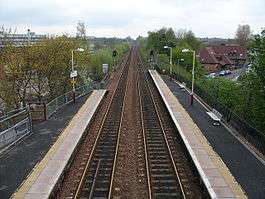Bishopbriggs railway station
| Bishopbriggs | |
|---|---|
|
Looking east (towards Lenzie) from the footbridge | |
| Location | |
| Place | Bishopbriggs |
| Local authority | East Dunbartonshire |
| Coordinates | 55°54′14″N 4°13′30″W / 55.9038°N 4.2249°WCoordinates: 55°54′14″N 4°13′30″W / 55.9038°N 4.2249°W |
| Grid reference | NS610701 |
| Operations | |
| Station code | BBG |
| Managed by | Abellio ScotRail |
| Number of platforms | 2 |
|
Live arrivals/departures, station information and onward connections from National Rail Enquiries | |
| Annual rail passenger usage* | |
| 2010/11 |
|
| 2011/12 |
|
| 2012/13 |
|
| 2013/14 |
|
| 2014/15 |
|
| Passenger Transport Executive | |
| PTE | SPT |
| History | |
| Original company | Edinburgh and Glasgow Railway |
| Pre-grouping | North British Railway |
| Opened | 21 February 1842[1] |
| National Rail – UK railway stations | |
| * Annual estimated passenger usage based on sales of tickets in stated financial year(s) which end or originate at Bishopbriggs from Office of Rail and Road statistics. Methodology may vary year on year. | |
|
| |

Bishopbriggs railway station is a railway station serving Bishopbriggs in East Dunbartonshire, Scotland. It is located on the Glasgow to Edinburgh via Falkirk Line, 3 1⁄4 miles (5.2 km) north of Glasgow Queen Street, but is currently only served by services on the Croy Line.
History
Bishopbriggs was one of the original stations on the Edinburgh and Glasgow Railway, opened in 1842. During the 1960s, the station was scheduled for closure under the Beeching Axe but a local campaign managed to save it, although the original station buildings and footbridge were demolished. They were replaced by a modular ticket office and waiting room, as well as a new footbridge. The ticket office and waiting room was replaced with a modern glass and steel building in 2002, of a similar design to that at Croy railway station.
Present day
There are currently proposals to extend the platforms at Bishopbriggs station during 2009 in order to facilitate the operation of six-car trains on services between Glasgow Queen Street and Stirling.[2]
Absolutely no parking on nearby streets and no car park.
Services are provided by Abellio ScotRail, primarily using Class 170 Turbostar trains.
The station was briefly featured in Bill Forsyth's 1980 film That Sinking Feeling.
Services
2006/07
- Mondays to Saturdays: there was generally a half-hour service southbound from Platform 2 to Glasgow Queen Street and northbound services from Platform 1 terminating alternately at Stirling or going onwards to Dunblane.
Change at Croy for Edinburgh or at Stirling for Alloa, Perth, Dundee, Aberdeen.
- Sundays: there was an hourly service in each direction.
From May 2008
- Mondays to Saturdays: There is generally a half-hour service southbound from Platform 2 to Glasgow Queen Street and northbound from Platform 1 to Stirling with alternate services going onwards to Dunblane and Alloa, as a result of the completion of the Stirling-Alloa-Kincardine rail link.
- Sundays: There is an hourly service in each direction to Glasgow and Alloa.[3]
| Preceding station | |
Following station | ||
|---|---|---|---|---|
| Glasgow Queen Street | Abellio ScotRail Croy Line |
Lenzie | ||
| Glasgow Queen Street | Abellio ScotRail Glasgow to Edinburgh via Falkirk Line |
Lenzie | ||
| Historical railways | ||||
| Cowlairs | Edinburgh and Glasgow Railway North British Railway |
Lenzie | ||
References
Notes
- ↑ Butt (1995), Page 35.
- ↑ Scotland's Railways - Implementation plan
- ↑ Table 230 National Rail timetable, May 2016
Sources
- Butt, R. V. J. (1995). The Directory of Railway Stations: details every public and private passenger station, halt, platform and stopping place, past and present (1st ed.). Sparkford: Patrick Stephens Ltd. ISBN 1-8526-0508-1. OCLC 60251199.
- Jowett, Alan (March 1989). Jowett's Railway Atlas of Great Britain and Ireland: From Pre-Grouping to the Present Day (1st ed.). Sparkford: Patrick Stephens Ltd. ISBN 1-8526-0086-1. OCLC 22311137.
